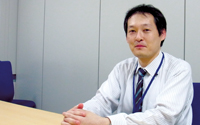Aug. 6, 2012
Crafting a career at RIKEN
Hiroyasu Ishida, Manager

Collaborations Division, RIKEN Research Cluster for Innovation
How and when did you join RIKEN?
I joined RIKEN in April 1997 and have been working here for 15 years. I decided to join RIKEN after learning about its status as a world-class research institute for basic research. I also connected with the idea of using scientific and technological achievements to make our societies more prosperous.
Please tell us about your work at RIKEN.
Since joining RIKEN, I have worked in several positions at the Wako Institute, Tsukuba Institute and the Ministry of Education, Culture, Sports, Science & Technology (MEXT).
I was first assigned to the General Affairs Division at the Wako Institute, where I was in charge of general administrative tasks. Then I moved to the BioResource Center at the Tsukuba Institute, where I oversaw administrative support for supplying biological materials to researchers in Japan and around the world.
While at MEXT, my responsibilities were related to acquiring funding for research on accelerator science, and support and liaison with MEXT committee offices and accelerator science researchers at various institutions.
For seven years I was based at the Technology Transfer Office, where I handled collaborative research agreements and patent licensing agreements between RIKEN and private companies in Japan and overseas.
Now as manager of the Innovation Promotion Section, I focus on how to create a better working environment for our staff and how to keep their motivation high. It is a continual learning experience for me, but I am building on the knowledge and experience I have gained at RIKEN up until now.
What have been the highlights of your time at RIKEN so far?
My time at the Technology Transfer Office has left the biggest impression on me. My work there specifically involved drafting both collaborative research and patent licensing agreements that were entered into with private companies, checking the contractual details, and negotiating with the parties until they were satisfied and signed the agreements.
When moving forward with a collaborative research agreement, it is important to first know what the researchers want to accomplish, and then to have a basic grasp of the research contents. When negotiating with a company, it is important to clearly understand their requirements for entering the collaboration. Knowledge of the law, intellectual property rights and business customs is also necessary.
I started with very little knowledge in these areas, but the coordinators I worked with gave me tremendous support. Originally from private companies, they were very knowledgeable about company management and the latest trends in technology. From working with them, I learned how to express my viewpoints and requests, and how to create win-win relationships with everyone involved.
These experiences have been very useful even in the new work I am doing now.
What is the best thing about working at RIKEN?
RIKEN’s strengths are the diversity of staff working here with various skills, knowledge and backgrounds. RIKEN also fosters a very close relationship between researchers and administration. Both sides discuss how to achieve what researchers want to do, which creates a work environment conducive to producing top-quality output.
